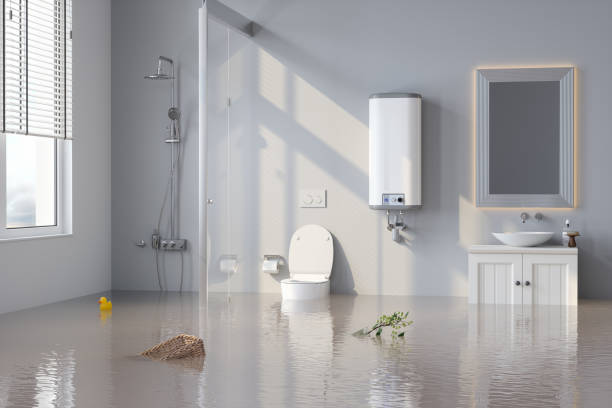
Water heaters are essential appliances in modern households, providing hot water for various purposes, including bathing, cooking, and cleaning. While water heaters are generally reliable, they can occasionally develop leaks, posing a potential risk of water damage to your home. A water heater leak may start as a small drip but can become a significant problem if addressed. In this article, we’ll explore the causes of water heater leaks, the potential for water damage, and the preventive measures you can take to safeguard your home.
Understanding Water Heater Leaks
Water heater leaks can occur for several reasons, from normal wear and tear to faulty components or improper installation. Here are some common causes of water heater leaks:
Corrosion: Over time, the internal components of a water heater, particularly the tank, can corrode due to exposure to water and minerals. Corrosion weakens the metal, eventually developing small holes or cracks through which water can escape.
Faulty Temperature and Pressure Relief Valve: The temperature and pressure relief (TPR) valve is designed to release excess pressure and prevent the water heater from exploding in the event of overheating. If the TPR valve malfunctions or becomes stuck, it may cause water to leak from the valve or around its connection points.
Sediment Buildup: Sediment, such as minerals and debris in the water supply, can accumulate at the bottom of the water heater tank over time. This sediment buildup can insulate the bottom of the tank, causing it to overheat and eventually develop cracks or leaks.
Loose or Damaged Connections: The fittings, joints, and connections on a water heater can degrade over time, leading to leaks at these points. Loose or damaged connections may result from improper installation, frequent temperature fluctuations, or simply the natural aging of the appliance.
High Water Pressure: Excessive water pressure can put undue stress on the water heater’s components, leading to leaks or ruptures in the tank. If your home’s water pressure exceeds the recommended levels, installing a pressure regulator is essential to prevent damage to your water heater and plumbing system.
Potential for Water Damage
A water heater leak, regardless of its size or severity, can cause significant water damage to your home if not addressed promptly. Here are some of the potential consequences of a water heater leak:
Structural Damage: Water leaking from a water heater can saturate building materials such as drywall, insulation, and wooden framing, leading to structural weakening, warping, and decay.
Mold and Mildew Growth: Moisture from a water heater leak creates an ideal mold and mildew growth environment. Mold can increase rapidly, posing health risks to occupants and requiring costly remediation efforts to mitigate.
Damage to Personal Belongings: Water damage from a leaky water heater can ruin furniture, electronics, clothing, and other nearby belongings. Items stored in basements or utility closets are particularly vulnerable to damage.
Electrical Hazards: If water comes into contact with electrical outlets, appliances, or wiring near the water heater, it can pose a risk of electrical shock or fire. This risk is especially pronounced in homes with poor electrical insulation or faulty wiring.
Decreased Indoor Air Quality: Excess moisture from a water heater leak can contribute to elevated humidity levels indoors, fostering the growth of mold, mildew, and bacteria. Poor indoor air quality can exacerbate respiratory issues and allergies among occupants.
Preventive Measures
While water heater leaks can occur unexpectedly, there are several preventive measures you can take to reduce the risk of water damage to your home:
Regular Maintenance: Schedule annual maintenance inspections for your water heater to check for signs of corrosion, leaks, or other issues. Flushing the tank periodically to remove sediment buildup can also prolong the lifespan of your water heater and prevent leaks.
Replace Aging Units: If your water heater is approaching the end of its lifespan (typically 10-15 years for traditional tank-style heaters), consider proactively replacing it with a new, energy-efficient model. Newer water heaters often have features that reduce the risk of leaks and improve performance.
Install a Leak Detection System: Consider installing a water leak detection system near your water heater to alert you to any leaks or abnormal water flow. These systems can provide early warnings, allowing you to take swift action to prevent water damage.
Maintain Adequate Pressure: Ensure your home’s water pressure is within recommended levels (typically 40-60 psi) by installing a pressure regulator if necessary. High pressure can strain your water heater and plumbing system, increasing the risk of leaks and other issues.
Inspect and Repair Seals and Connections: Regularly inspect your water heater’s seals, fittings, and connections for signs of wear or damage. Tighten any loose connections and replace worn seals to prevent leaks from occurring.
Conclusion
While a water heater leak may seem minor, it can cause extensive water damage and costly repairs if not addressed promptly. By understanding the common causes of water heater leaks, recognizing the potential for water damage, and implementing preventive measures, you can protect your home and ensure the continued functionality of your water heating system. Remember, proactive maintenance and vigilance are key to safeguarding your home against the risks associated with water heater leaks.





